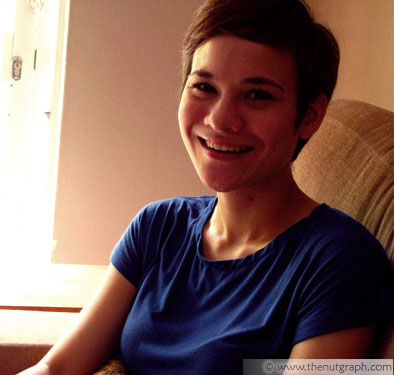
Aishah Sinclair (all pics below courtesy of Aishah Sinclair)
In this candid interview about being Malaysian, Aishah, who currently co-hosts ntv7’s The Breakfast Show, talks about where her family is from and what being Malaysian means to her.
“I am extremely proud to be Malaysian. I wouldn’t want my child to grow up anywhere else,” the actress and TV host says in an interview in her Kuala Lumpur home on 23 Nov 2011.
Apart from ntv7, Aishah has also hosted several shows for TV3, 8TV and RTM, and acted in the movies Gol & Gincu and Bujang Senang, the Realiti drama series, and the telemovie Hilang.
Aishah, along with her brother Ashraf, and award-winning actor Sazzy Falak founded entertainment-based company SinclairFalak Sdn Bhd which is responsible for the Acting Saved My Life! Success Series Workshop.
What future is she looking forward to in Malaysia? Professionally, she is venturing into drama and film production. And as a Malaysian, she would like to see meritocracy where all citizens have equal opportunities.
TNG: You were born on 27 Oct 1980. Where were you born and where did you grow up?
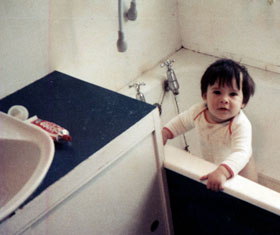
One-year-old Aishah in Croydon, London
Then we balik kampung.
Balik kampung here?
No, in England. Kampung in England was in St Anne’s-on-the-Sea. That’s where my grandmother lived and that’s where my father grew up. And we stayed with grandma in a house that was just down the road from the seaside.
And then after that, we moved to Cambridge where we stayed for about a year or so and then we moved back to Malaysia in 1986. I was six years old.
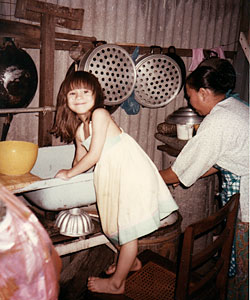
A five-year-old Aishah helping with the dishes in her grandfather’s house in Ipoh
It was fun but school was tough. We moved in late 1986 and I remember not long after that, going into Standard 1. And my grasp of Malay was really, really bad. I think it was more of a mental block than anything. Standard 1, Standard 2 even, I had a hard time because I couldn’t grasp the language and I had a really horrible teacher.
Because of the language barrier, it was a lot harder to make friends. I could speak Malay but I would suddenly not be able to read it. It was dyslexia in Malay [laughs].
[Laughs] Well, and you’ve gotten over that…
Ya, well, to a certain extent [laughs].
So, what’s the strongest memory you have of the place you grew up whether in England or in Malaysia?
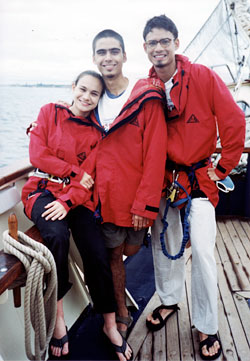
With her brothers, Ashraf and Adam, on the vessel STS Leeuwin II in Freemantle, Australia in 2001
In St Anne’s, because we lived down from the sea, I remember one very wet day, we were wearing boots and our raincoats – it was just Ashraf, my dad and I – and we walked to the sea and there was this little fish that was beached. It was “Oh, no, we must save it! What do we do?” So what my dad did was he picked it up and he threw it back into the sea [laughs] and we went, “Oh, we saved that fish!”
And in Riyadh, during the winter my parents would pack the whole family up and go in their Land Rover and drive up to the sand dunes and we’d spend the whole day just picnicking and sliding down the dunes.
Most of my memories of childhood are of the outdoors. Even when I was 11 or 12 and we were living in Bangsar, I remember my friends and I just crawling around the drains in Bangsar [chuckles]. It was, “Hey, this drain, if you cross it, it leads to there.” So, this drain would end up in a main road and then suddenly we would come up and “Oh my god! We’re here!” It would be a shortcut!
So your dad is English. Mohamed AJ Sinclair.
Yes, he was born Anthony John Sinclair. When he embraced Islam a year before he married my mum, he was in England. And so when he embraced Islam, he was asked “What’s your Muslim name going to be?” And he was, “Oh, I didn’t think of one.” “Oh, ok, what’s your future wife’s name?” “Khadijah (Abdul Rahman).” And Khadijah was the Prophet Muhammad’s first wife. So, they were like, “Oh, then you must be Muhammad!” So, that’s how he got his name. So they just put “Muhammad” in front of Anthony John.
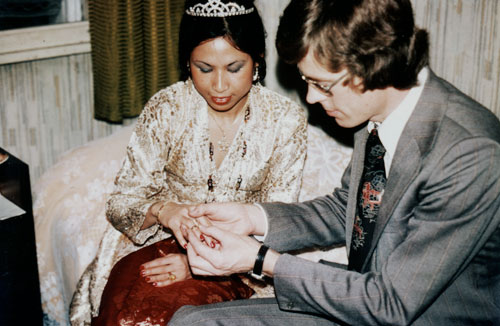
Aishah’s parents got married in a friend’s house in London in 1976
Yes. So he’s no “bin Abdullah”. So, he didn’t lose his identity.
Ya, I think it’s so sad, right, when they do that here [because then a person’s identity is replaced with another]. My aunties and uncles in England still call my dad Anthony. I think it’s important because whenever you embrace Islam, I believe the relationship is between you and God. A lot of cultures all around the world keep their names [even after conversion to Islam] and what’s wrong in keeping it?
Can you trace the ancestry of both your parents?
Sinclair can be traced to a baron in Ireland. But there was a family conflict and the baron had to run away to Scotland.
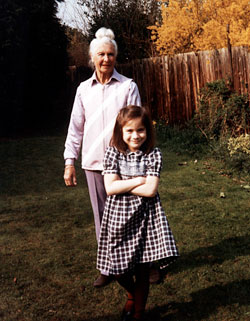
With her paternal grandmother in England
They lived in Leeds and Hull and my father was born in Yorkshire. So a combination of Irish, Scottish and English. Sinclaire has a kilt. The emblem is Cock of the North.
On my mother’s side, my grandfather’s ancestors came from Jawa. Those days the Javanese who travelled were the Javanese with money. They were traders. They landed in Tambun. They became wealthy tin miners with huge mines. But they didn’t know how to take care of their wealth. They lost all that wealth from the mines and so my grandfather and all settled in Tambun and Ipoh.
My maternal grandmother’s origins are Arab. From Saudi Arabia. They landed in Teluk Intan which was Teluk Anson those days. We’ve been able to trace back distant family members in Mecca. Anyway, my grandparents got married and settled in Ipoh.
Both my maternal grandparents were born in Malaysia. My grandmother was born in Ipoh. They knew how old she was because when she was born, they planted a coconut tree.
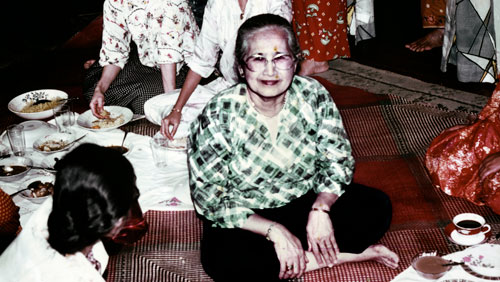
Aishah’s maternal grandmother whom she never got a chance to meet
I went to primary and secondary school here. And for my tertiary education, I was at UiTM, Shah Alam [where she got her Bachelors in Mass Communication]. So I was always part of the gang. And I never thought myself different. But I remember this happened several times in high school where I would be with my friends and as girls, we’d go to the toilet together. I would wear the baju kurung every single day because that’s just the way my father liked it. Funny kan? My mat salleh father says no to the pinafore. So, I’d go to the toilet with all my girlfriends and you know, you check in the mirror to see how you look, and suddenly I get a shock at how white I am. Like, “Whoa! Who is that? Gosh, it’s just me!” [Laughs] I swear! So, I forget that if you look at me, I may seem different but I never felt different. I always felt like part of the gang.
I’ve spent my whole life here pretty much. England is just a memory from the past and to know that I do have roots there. And if I do want to go live there, I have right of abode and I used to have a British passport. But that’s the only thing that sort of links me to England. I’ve always been, and I always will be, Malaysian.
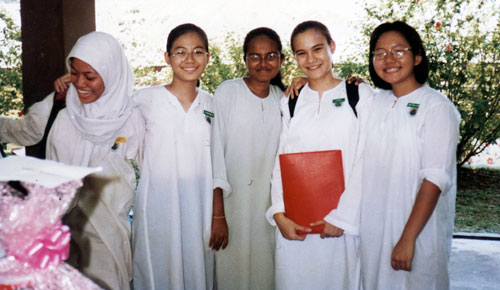
With her Form 5 classmates from SM Bukit Bandaraya, Bangsar. Aishah is second from right.
Mum went to England to do nursing. And daddy was a pharmacist at the hospital where my mum landed off the boat.
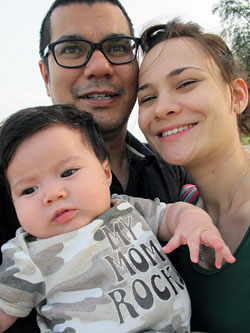
Aishah and her husband, Shaikh Abdul Shahnaz, with six-month-old Soraya in Penang on her first holiday
Well, the first thing I will teach her when she starts speaking is, because we have this thing in Malaysia where we ask, “What are you?” “I’m Chinese” or “I’m Indian”. And if you ask anyone from overseas who asks that question and if I reply, “I’m Chinese”, their response would be “Oh, you’re from China.” “No, no, no I’m from Malaysia.” “That means you’re Malaysian.” “Oh, yes.”
So, the first thing I’m going to teach her is that she’s Malaysian. Soraya has so many different ethnic backgrounds in her — my husband’s side is Chinese and Indian. And people might say whatever about her later, she is still Malaysian, and nobody can change that.
What box for race do you tick when you’re asked to fill in forms?
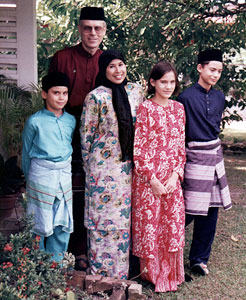
Hari Raya Aidilfitri with her parents and brothers at Aishah’s maternal grandfather’s house in Ipoh
And then I went to UiTM, and that was for bumiputeras, so I thought “Hey, I guess I must be Malay then”. But now, I’m Malaysian. I strongly think that for this country to move forward, we must be Malaysian. If you fill in application forms for university overseas, they would sometimes ask you what your ethnic background is but your ethnicity would have nothing to do with whether you’re accepted or not. Here, we have a quota.
In order for us to really get over this whole segregation of “What are we?” then really, just get rid of the boxes. You know, what are you? Are you Malaysian? Are you non-Malaysian? Which passport do you hold? Is your IC red or blue? I think we just need to focus on that and get rid of the rest. Because eventually, in Soraya’s generation, you’ll probably not be able to find a “pure” Malay or Indian because everybody is bound to be a mix of something.
So, I will tell Soraya, you are whatever you want to be. You are Malaysian. Be extremely proud of that.
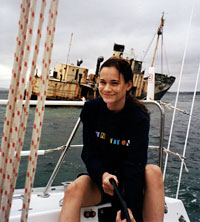
A 16-year-old Aishah sailing in Australia
Every country has its problems. But I am extremely proud to be Malaysian. I wouldn’t want my child to grow up anywhere else. Yes, I do wish some things like the education system were revised and could be a lot better. I may work in other countries, my kids may go to school overseas but I wouldn’t want to call anywhere else home. Malaysia will be home.
Are there any aspects of your identity that you struggle with as a Malaysian?
Maybe when I was growing up, yes. But today, because Malaysia is just so diverse, I don’t feel any struggle with my identity.
You work in the media and entertainment industry. Do you find that people struggle with your identity?
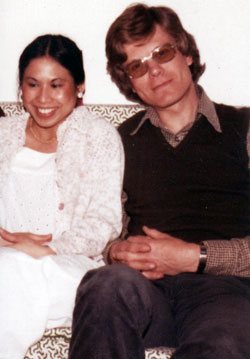
Aishah’s parents, Khadijah Abdul Rahman and Mohamed AJ Sinclair, early in their marriage in the UK
One of the first criticisms I received as a TV host had nothing to do with the way I hosted. It was an anonymous online comment about the show I was hosting with 8TV and this person said, “Just what we need — another half-breed freak hosting another TV show.” I thought, “How dare you say that?” I can’t change who I am. I can improve my skills as a host, fine. But this was a direct attack at who I was. I thought, “What makes you more Malaysian than me?”
And there was a time also when our ministry said we had too many Pan-Asian faces in the market and we needed to focus more on the more local-looking people. I felt, “Ok, look. Don’t make it about the Pan-Asians who happen to be Malaysian. If you want to make it about something, make it about hiring Malaysians instead of non-Malaysians.”
Sometimes people ask me — they don’t ask me so much now, this was about a year or two back — “Do you think there are too many Pan Asians? What advantage do you think you have as a Pan-Asian?” Nothing! If you don’t have the skills, you can’t make it. Fine, it may open up a few doors but suddenly people assume, “Eh, this person no talent lah.”
I mean, look at those who made it big. They are just really talented. I think that’s the way it should be. Based on merit and on how well you can do something.
Describe the kind of Malaysia you would like for yourself and future generations.
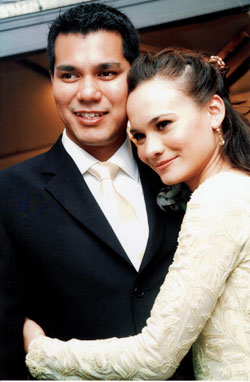
Shaikh Abdul Shahnaz and Aishah Sinclair on their wedding day on 7 Jan 2006
I did have a friend who said, “Ya, Aishah, even though you are mixed but you are Malay and you’re bumiputera. You don’t know how hard it is for me.” And he was Chinese [Malaysian]. And yes, there are stories of people who don’t get into public university even though they got 8As.
That’s why I want it to be based on merit. People who get what they get really deserve it because they are the best at what they do. So, for example, you got that business tender because your company had an amazing proposal.
And I think it will happen one day in Malaysia.

No comments:
Post a Comment